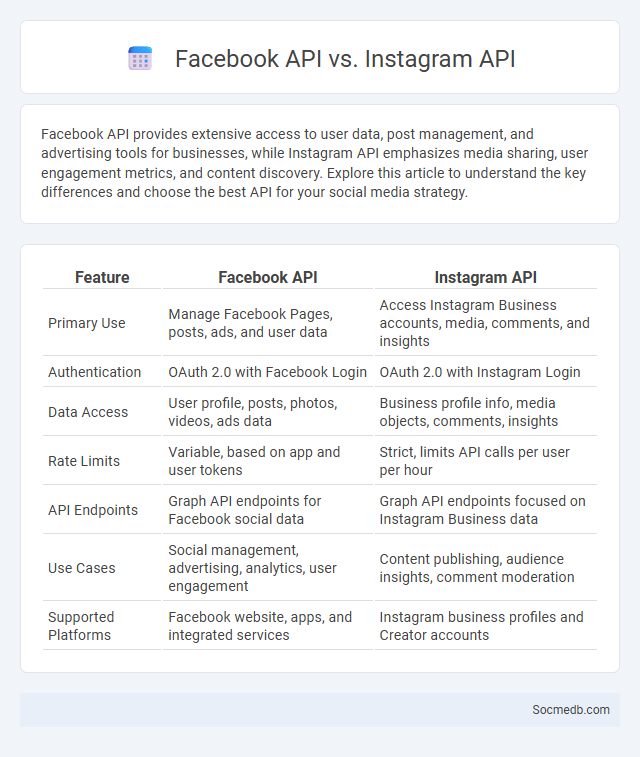
Photo illustration: Facebook API vs Instagram API
Facebook API provides extensive access to user data, post management, and advertising tools for businesses, while Instagram API emphasizes media sharing, user engagement metrics, and content discovery. Explore this article to understand the key differences and choose the best API for your social media strategy.
Table of Comparison
| Feature | Facebook API | Instagram API |
|---|---|---|
| Primary Use | Manage Facebook Pages, posts, ads, and user data | Access Instagram Business accounts, media, comments, and insights |
| Authentication | OAuth 2.0 with Facebook Login | OAuth 2.0 with Instagram Login |
| Data Access | User profile, posts, photos, videos, ads data | Business profile info, media objects, comments, insights |
| Rate Limits | Variable, based on app and user tokens | Strict, limits API calls per user per hour |
| API Endpoints | Graph API endpoints for Facebook social data | Graph API endpoints focused on Instagram Business data |
| Use Cases | Social management, advertising, analytics, user engagement | Content publishing, audience insights, comment moderation |
| Supported Platforms | Facebook website, apps, and integrated services | Instagram business profiles and Creator accounts |
Overview of Facebook API
The Facebook API enables developers to integrate Facebook's social features, allowing access to user data, posts, and interactions while maintaining privacy controls. It supports various endpoints such as Graph API, Marketing API, and Messenger API to facilitate functionalities from content sharing to ad management and chatbots. Robust documentation and regular updates ensure developers can create dynamic social applications leveraging Facebook's extensive user base and data ecosystem.
Overview of Instagram API
Instagram API enables developers to integrate Instagram's features into their applications, allowing seamless access to user profiles, photos, videos, and insights. You can leverage the Instagram Graph API for business accounts to retrieve metrics, manage media, and analyze engagement effectively. This powerful tool enhances your social media strategy by providing real-time data and automation options.
What Are Third-Party Apps?
Third-party apps are software applications developed by external companies or individuals that integrate with social media platforms to enhance user experience, provide additional functionalities, or enable data sharing. These apps often require permission to access your social media account data, such as friends lists, posts, or personal information, to deliver personalized features like analytics, scheduling, or content management. Understanding the permissions granted to third-party apps is essential for maintaining your privacy and data security on social media.
Key Features Comparison
Social media platforms differ in key features such as user interface, content formats, and engagement tools. Instagram emphasizes visual storytelling through photos and short videos, while Twitter focuses on brief, real-time updates and hashtags for trending topics. Understanding these distinctions helps you choose the platform that best fits your communication style and audience engagement goals.
Authentication and Permissions
Social media platforms implement robust authentication methods such as multi-factor authentication (MFA) and OAuth to ensure secure user access. Fine-grained permissions control enables users to manage privacy settings, determining who can view, comment, or share their content. Advanced access management reduces unauthorized account takeovers and enhances data protection across networks.
Data Access and Limitations
Social media platforms collect vast amounts of user data, granting you access to detailed analytics such as engagement metrics, user demographics, and content performance insights. However, data access is often limited by privacy policies, API restrictions, and platform-specific data sharing agreements, which can restrict the depth and type of information available for analysis. Understanding these limitations is crucial for optimizing your social media strategies and ensuring compliance with data privacy regulations like GDPR and CCPA.
Integration Capabilities
Social media platforms offer extensive integration capabilities through APIs and third-party tools, enabling seamless connection with marketing, customer service, and analytics software. These integrations facilitate automated content sharing, real-time engagement tracking, and unified data management across multiple channels. Enhanced integration capabilities empower businesses to optimize social media strategies, improve user interactions, and drive measurable growth.
Security and Privacy Considerations
Protecting your personal data on social media involves using strong, unique passwords and enabling two-factor authentication to prevent unauthorized access. Regularly reviewing privacy settings allows you to control who can view your posts and personal information, minimizing the risk of data breaches. Being cautious about the information you share and avoiding suspicious links helps safeguard your online identity from cyber threats and privacy invasions.
Use Cases and Best Practices
Social media platforms are essential for brand engagement, customer service, and targeted advertising, driving measurable increases in reach and conversion rates. Best practices include crafting platform-specific content, utilizing analytics for audience insights, and maintaining consistent posting schedules to enhance visibility. Leveraging user-generated content and interactive features like polls and live videos significantly boosts community interaction and trust.
Choosing the Right Option for Your Project
Selecting the right social media platform depends on your project's target audience, content type, and engagement goals. Platforms like Instagram and TikTok excel for visual storytelling and younger demographics, while LinkedIn is best for B2B networking and professional content. Understanding these dynamics ensures you maximize your project's reach and impact effectively.
 socmedb.com
socmedb.com